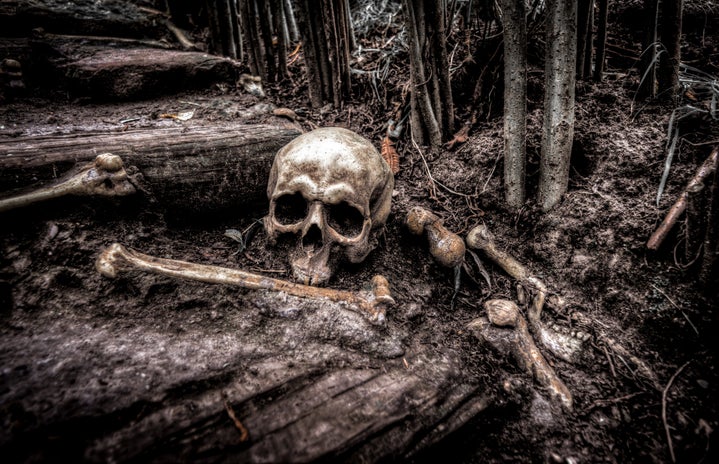I’ve always been fascinated by Dante Alighieri’s three-part epic, The Divine Comedy. This fourteenth century poem takes readers on a fictional and very descriptive tour through the realms of the Afterlife. Of all three parts, Inferno has always been my favorite. The main character, Dante himself, is guided through the bowels of Hell by the Italian poet Virgil. During his journey, he describes the punishments that are cast upon sinners in the nine circles of hell. Since it is the spooky season after all, I think it’s an appropriate time for us to contemplate if we’d endure the punishments for our sins in Inferno.
“Abandon all hope, ye who enter here.”
Limbo, Circle 1:
If you’re a virtuous, unbaptized pagan, you’re bound to be placed in the first circle of hell: Limbo. In this area of the underworld, the souls rejected by heaven and hell spend all eternity in an inferior form of Heaven. If you’re in Limbo, your transgressions technically weren’t that bad. But this region is only reserved for the non-believers who did great deeds and did not commit any other deadly sin.
Lust, Circle 2:
If you can’t control your sexual appetite, welcome to the second circle of hell. Reserved for the lustful and adulterous, this part of hell tortures souls by tossing them around in endless, stormy winds. If this isn’t how you plan on spending the rest of eternity, but you don’t feel happy staying monogamous, consider having open relationships instead.
Gluttony, Circle 3:
While eating is great, overindulging will most likely guarantee you a place in hell. However, you won’t be eating gourmet foods in the underworld. In the presence of the three-headed dog Cerberus, the souls of the gluttonous swim in a pool composed of putrefying mud and living organs while icy rain and human waste pours down on them.
Greed, Circle 4:
Don’t be quick to hoard or squander your riches. Guarded by Plutus, the roman god of wealth, this circle divides the avaricious in two groups: the hoarders and the spenders. The souls of the greedy spend eternity pushing huge boulders with their chests and slamming them into each other. When Dante arrived on this circle, he encountered many clergymen, cardinals, and popes. But by the time you get there, you’ll most likely joust eternally with a few billionaires.
Wrath, Circle 5:
The souls of the wrathful are condemned to an eternity in the decaying and motionless river Styx. If you’ve been highly driven by anger, you’ll be condemned to spend eternity on the surface fighting other vicious, angry souls. Likewise, if you have a lot of pent-up anger, you’ll waste away in the depths of the rotten, muddy water.
Heresy, Circle 6:
This region marks the beginning of lower hell. From this point on, we find the souls that have committed the most heinous of crimes. The sixth circle tortures heretics by placing them in burning tombs for all eternity. Unlike Limbo, where pagans remain eternally without punishment or redemption, this circle only tortures the souls that have somehow profited or benefited from Christianism.
Violence, Circle 7:
Divided into three rings, the seventh circle of hell houses the violent. The first ring torments souls who were violent towards others by dipping them in the Phlegethon, a river of scorching blood and flames. The second ring contains the dried-up souls of those who were violent against themselves. The last ring tortures the blasphemers by stranding them in a large desert of scorching sand while a never-ending firestorm falls upon them.
Fraud, Circle 8:
In the largest circle of hell, the fraudulent are organized in 10 different trenches. Among the tortured you’ll find the corrupt, seducers, sorcerers, hypocrites, thieves, false counselors, and falsifiers. Just like Dante witnessed corrupt politicians being endlessly submerged in a blazing lake of hot lava, you too may encounter a handful of government leaders when you get there.
Traitors, Circle 9:
The last circle harbors the most atrocious of sinners: the traitors. This last province of hell consists of a frozen lake divided into four rounds. Depending on the severity of the betrayal, souls in each of these spheres are somewhat or completely frozen for eternity. It’s in this circle where the devil sits vigilant while continuously devouring three infamous traitors: Brutus, Cassius, and Judas.
Now that you’ve toured Inferno, did you identify the circle you’ll spend eternity in? Are you ready for the eternal punishment that awaits?
Will you make it to Paradise?
While it is somewhat entertaining to compare the severity of our sins with the metrics of Dante’s Inferno, his poem is an allegory for the redemption of the human soul. After leaving Hell, Dante begins his journey to Purgatorio, a seven-terrace forefront to paradise where souls wait for salvation. However, redemption isn’t painless and, before entering heaven, these souls must go through a rigorous cleansing process.
Unlike Alighieri’s epic where sinners are assigned to their respective fates, we decide who we want to be and how we treat others during our lifetimes. While it’s important to take care of ourselves, it’s equally important to take care of the people around us. Therefore, we need to be aware of how our decisions affect our community .
In a capitalist society, reaching the billion-dollar mark is a privilege very few people attain. As consumers, we’ve been programmed to spend our riches on temporary luxuries to increase our self-esteem or to flaunt our societal status. And, unless acknowledgement is guaranteed, most millionaires aren’t encouraged to help alleviate some of the world’s heaviest burdens, like world hunger or poverty. Even though these problems aren’t theirs to fully carry, they’ve been privileged enough to aid in these matters that affect humanity as a whole.
The Devil is in the details
Small decisions also have a huge impact on the world. While we may think the answer lies exclusively on the shoulders of the wealthy, we too need to start contributing in smaller ways. Of course, not all of us can spare the change to pay it forward financially, but being more conscious of the small decisions we make on a daily basis can help in the bigger picture. For example, did you know that global starvation is not caused by lack of food but by its spoilage? Research by the USDA found that 30% to 40% of food is spoiled at every stage of production and supply. This means we need to collectively improve how we produce and buy our food to help mitigate one of the world’s most harmful ongoing problems.
Of course, it’d be a dream come true if all the billionaires in the world decided to equally distribute their wealth with everyone. But because this is far from attainable, we need to come together to make this world a better, safer, and more equal place. And these changes can begin in our own communities. Despite our privileges or lack thereof, we decide if we’re greedy, spiteful, or unjust towards others. We need to collectively observe what is just and right for all humans in all social positions to be able to change the systems that perpetuate inequality.
Just like in Dante’s Purgatorio, we too can redeem ourselves in the physical plane. Regardless of what we’ve done to cause harm, what matters is what we do from this point onwards to make amends. Change isn’t an easy or painless process. It involves discovering and healing inner wounds and collective traumas. It requires acknowledging our privilege, humbling ourselves, and helping others.
The Underworld may or may not exist, but if we continue to make decisions that benefit the few and prolong the suffering of the masses, we are sure to create our own Inferno here on Earth.


